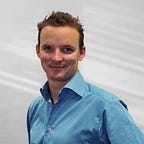From Facebook to ∇
After 3 ½ amazing years at Facebook since the acquisition of Wit.ai, I am about to become entrepreneur again.
I’d like to say a few words about my experience at Facebook before unveiling the new project, Nabla.
Being acquired by Facebook
It all started in November 2014, with a meeting with David Marcus (and an email from Zuck… which I nearly deleted on the fly, thinking it was a scam). I had been the CEO of my own companies for the past 14 years and never worked more than 3 months for a “large” company, so I was a bit nervous. I was about to jump from surprise to surprise. Here are a few impressions I vividly remember from the first weeks at Facebook:
- People. They are nice and enthusiastic, the very embodiment of “assume good intent”. Employees who join FB straight out of school will never understand what I mean: this is very extraordinary at a large company.
- Speed and scale. Facebook is a well-oiled machine that runs at startup speed with near-unlimited resources. My 50-employee startup before Wit.ai had slower engineering and more political issues than the 8000-employee Facebook I joined.
- Smart integration. To my surprise, my boss Raymond did not force us to port Wit.ai to Facebook’s stack (it was written in Clojure, running on JVM, using a Datomic database…). We were able to move all our exotic stack from AWS to FB’s datacenters in a matter of days — with the unwritten rule that we are responsible to monitor and maintain our non-standard systems ourselves. With growing popularity, some Wit.ai components began to fail more often. Of course after you’ve had to wake up 5 times in the middle of the night to restart your Datomic database, you get more motivated to switch to FB’s supported MySQL! So we ported Wit.ai to FB stack piece by piece, over almost 2 years, following priorities set by the real world of production instead of a manager agenda.
- Zuck. I could write a book about these few meetings…
In 2016 I moved to Paris and joined Facebook AI Research to help develop our European AI Research lab. I couldn’t believe that Yann LeCun, Antoine Bordes, Ronan Collobert, Jason Weston, all these mythical names that were the authors of my favorite scientific papers, all became my colleagues and friends. I obviously suffered from impostor syndrome for a while. I remember one lunch early on: the group was talking about Michael Jordan. Took me a while to realize that at FAIR, when you say MJ, it’s obviously the machine learning researcher that you are talking about, not the basketball player…
In Paris Facebook is still a startup, with an interesting mix of barefoot AI scientists and formally-dressed sales/marketing/policy/comms people. That diversity and atmosphere are priceless. The team is small enough that you can do many things beyond official roles and functions. On top of my official job, I ended up travelling through Europe and Asia to support sales, comms and policy. I learned a lot from Laurent Solly. I love to think that a 20,000+ employee company can still improvise and move very fast.
I’m also proud of the original Wit.ai team who is still in Menlo Park making a lot of impact at Facebook, Laurent, Willy, Stepan, Julien, Anthony, Olivier. 5 years after we launched it on Hacker News, Wit.ai is still open and free, used by 180,000 developers worldwide, and actively developed.
I spent 3 1/2 years observing and learning, fascinated by this company that could grow so quickly while preserving speed, culture and people that would make a 20-employee startup jealous. Many times I thought: if only I could go back to my first startup! I’d do everything differently. Today, as I must say good-bye, my excitement to start a new company is doubled by the excitement to have the opportunity to apply all these lessons.
Introducing Nabla!
I’m cofounding Nabla with Martin Raison, who already was my partner-in-crime at Wit.ai and moved back to Facebook France in 2016, and Delphine Groll. Moustapha Cissé was also a key factor behind the idea and the decision to start without waiting. He is now starting Google’s AI efforts in Africa, but he is actively involved with us as a scientific advisor and more.
Our new startup, based in the Marais district in Paris, aims at bringing the benefits of AI to the “real world”, businesses in particular.
Nabla is an ambitious project. This time, we want to build something bigger. France and the EU supply an enormous amount of AI talent to the world but I’m afraid we are taking the same path to failure that we took for the Internet: twenty years after the Internet-enabled revolution started, we don’t have a single large, meaningful company in the space — and yet some engineering teams in Silicon Valley can speak French during their meetings! This may sound borderline ridiculous, but I feel I now have a mission to “give back”, to leverage what I learned and what I earned in the US to make an impact here in Europe.
We’re now building the core team of Nabla. If you know people who may be interested in joining our group of experienced entrepreneurs, top-notch scientists and passionate Machine Learning engineers for this journey… please send them our way! This is an opportunity to start at the very beginning, when everything needs to be invented. Our job positions are at https://nabla.com (or http://∇.com for the geeks).
Alex
“The real voyage of discovery consists not in seeking new landscapes but in having new eyes” — Marcel Proust.
